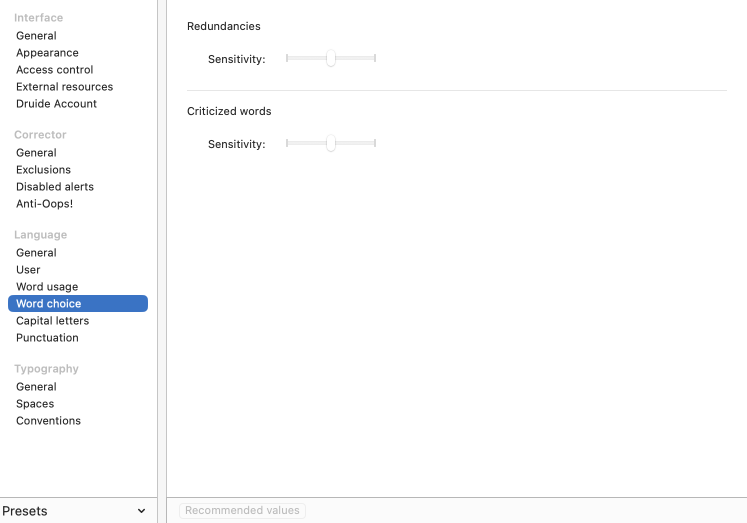Word Choice Panel of the Language Settings

French–English False Friends
A false friend is any two words that each belong to a different language and that share a close resemblance (in terms of spelling, pronunciation, context, etc.), but whose meanings in each language are different, in whole or in part. For example, the words librarie and library are famous French–English false friends because the French word librarie denotes a bookstore and not a public institution; the word library is translated into French as bibliothèque. Antidote recognizes several hundred potential false friends and flags them according to your settings: minimum (no detections), intermediate (the most common false friends are flagged) and maximum (all potential false friends are flagged).
- By default, the value of this setting depends on your mother tongue and your indicated ability in written English.
Redundancies
A redundant expression is one that is repetitive in terms of meaning (e.g. young puppy, unexpected luck, remake again). Depending on the nature of the text, this may constitute a genuine error, or, on the contrary, it may be the result of a deliberate stylistic choice. For this reason, redundancies are flagged in the Language view for possible correction and in the Style (Vocabulary) view for simple verification. This setting affects both views.
Choose from three levels of detection sensitivity:
- Minimum: The corrector does not flag any redundancies.
- Intermediate: The corrector flags those redundancies that are universally criticized (e.g. added bonus), but not those that are less serious (e.g. blend together).
- Maximum: The corrector flags all redundancies, regardless of how serious they are.
- The sensitivity for detecting redundancies is set to intermediate by default. To disable all such alerts, uncheck the Redundancies box.
Criticized Words
A criticized word is a word whose use is non-standard, either for all of its meanings (e.g. the conjunction and/or) or for only some of its meanings (e.g. the adjective economic is criticized in the sense of “cheap, affordable”, but not in its other common senses). Also criticized are names of certain trademarks used as generic terms (e.g. kleenex for tissue). The settings offer three alert levels: minimum (no detections), medium (words whose use is always criticized) and maximum (all possible criticized words).
- By default, criticized words are set to the medium alert level.